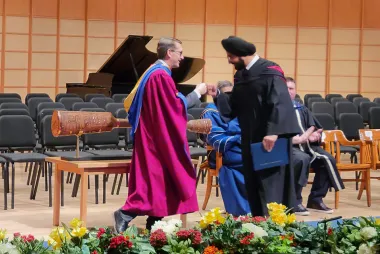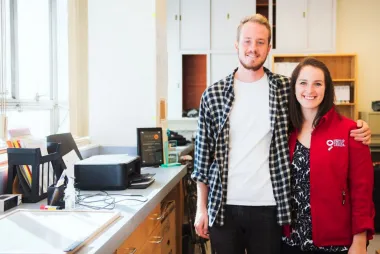John Swainson, Chair of the Board of Directors at Travelport, has over 40 years of technology industry experience, including roles as CEO of CA Technologies and President of Dell Software, and over 26 years at IBM Corp where he held various management positions in both the United States and Canada. In this Q&A, John shares how he leveraged his UBC mining engineering degree to establish a long and successful career in tech.
What was your first role after graduation? Was it the type of job you were expecting?
I don’t really know what job I was expecting. My initial idea was to go on to graduate school and do either an MBA or a law degree, but after going to school for five years, I was sick of it. So I decided I would get a job, and landed this job as a mineral processing engineer at a mine called Utah Mines in Port Hardy, BC. When we started going out there (in 1978), there was about 100 miles of logging road between Gold River and Port Alice. I had a car I was very proud of – it was a 1967 Mustang – and I just about broke the car driving over this logging road.
It was a really interesting job; I learned a ton because I got to do all kinds of interesting things. I discovered that I really like working with computers, and eventually decided that that was more interesting than mining. My timing was pretty good because the computer industry was just starting to explode, so I ended up leaving my job after about a year and joining IBM initially as a systems engineer. While I knew a little bit about computers, I didn’t know as much as I thought I did, so I had to learn a lot about computer programming and how people used computers for business purposes. My career evolved from there.
It was formative in the sense that it taught me a lot about working with people, managing people, and it ended up setting the stage for my career in technology.
Describe a situation where you had to make a decision that felt career-defining. How did you feel as you made the decision? What did you decide and how did it affect your career?
I’ve made a lot of career defining decisions over the course of my career, but deciding early on that I wanted to pursue a path that was more related to computers and business, over mining or the mineral processing industry, was the first and perhaps most important one.
It was a risky and challenging decision, because I didn’t have any experience in that area. I was confident in my ability to do it, but I didn’t really know what I was getting into. It involved getting up and moving from Port Hardy back to Vancouver, which is where I joined IBM. It was a new job, a new employer, and my wife and I were newly married, so it was a new job for her too. It was stressful – and I would say that these things are always stressful – but it was absolutely the right decision from a career point of view, because it set me off on a career that I’ve pursued for the last 40 years or so.
I never did go back to school. Frankly, I didn’t need to. After doing this for a couple of years, I was learning so much about technology, about the industry, and about business at IBM, that I didn’t feel I would benefit from going back and doing an MBA or some other advanced degree. I decided to keep working, and I guess that was the next big career decision that I made.
Over the course of 40 years, I've made a lot of career defining decisions. While some didn't quite work out the way I thought they would, in the end, they either left me with a set of new skills, new relationships, or just a different perspective.
What are the most important skills/qualities you’ve cultivated to help you get to where you are now?
I think there was one meta skill, if you like, and that was the ability to very quickly learn about a business, a problem, a technology. I’ve always been able to grasp and synthesize concepts fairly easily, and that I would say, gave me the confidence to take on new projects, knowing that I could figure out how to tackle any problem and be successful. That ability to reason and learn quickly was one of the principal skills I leveraged to get to where I am now.
Another one – and this goes back to some of the things we learned from Professor Blue Evans – is the ability to communicate effectively. Blue was a very big proponent of teaching engineers how to deliver effective presentations. Having good communication skills is something that I think has been incredibly helpful to me – the ability to relate to people, whatever their background, and being able to get along with people well. Since most of my career has been spent in management, that ended up being a pretty important skill.
Were there any lasting lessons learned from your time at UBC that have stuck with you over the years?
The reason that I went into mineral engineering was not because I had any particular affection for the mining industry. In fact, I knew next to nothing about the mining industry. I took the program because it offered a broad, general background in engineering topics. I got to see a couple of years of electrical, a couple of years mechanical, a couple years of civil – you got a very broad perspective, which was what I was looking for.
Prof. Blue Evans nurtured my ability to grasp a wide range of topics and encouraged me to take classes outside of the engineering department. I took four or five economics classes, four or five courses in computer science, and a couple of classes in business. I took a wide range of things that were well outside the standard curriculum, and I think it was broadly beneficial to me in my career. What I learned at UBC was a great catalyst for my future career.
If you could go back in time, what advice would you give to your younger self?
The main piece of advice I would give myself, or frankly anybody in that position starting in the workforce, is not to be afraid to take risks or to learn new skills.
If I look at what I did well over the course of my career, it was always as a result of taking some amount of risk, and frankly doing things that other people didn’t want to do; taking on jobs, taking on roles, taking on projects that were viewed as being too hard, too risky, that often involved geographic moves. I probably moved seven or eight times in the course of my career, always because I thought it would be an interesting opportunity and I would learn something as a result. So I guess that’s the best piece of advice that I’ve got for people is don’t be afraid to take risks or to learn something new because ultimately you will benefit from that.


